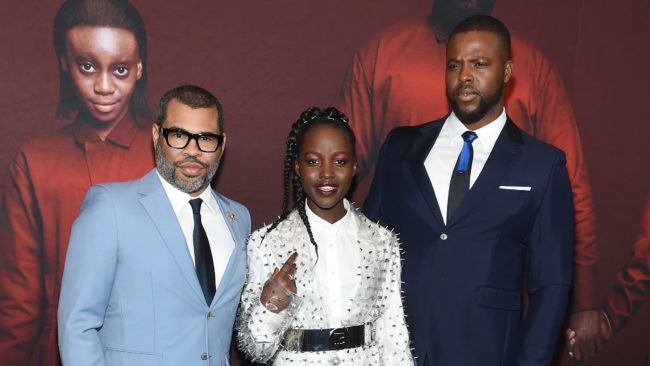His second directorial effort opened to a sensational $70 million in the U.S., the best start for an original horror title.
It’s official: writer-director Jordan Peele is a brand unto himself.
Two years after his feature directorial debut Get Out turned into a water-cooler sensation, Peele’s critically acclaimed Us exceeded all expectations by opening to a stunning $70 million in North America — the third-biggest horror debut of all time behind 2017’s It ($123.4 million), based on the Stephen King novel, and last year’s Halloween update ($76.2 million).
That wasn’t the only milestone. Us, from Universal,
secured the top launch ever for an original horror title after screaming louder than John Kraskinki’s A Quiet Place ($50.2 million). Ditto for an original R-rated movie after passing by 2012’s Ted ($54.4 million).
Universal also says that Us is the biggest opening for an original live-action pic since James Cameron’s 2009 Avatar ($77 million), unadjusted for inflation.
“Get Out certainly paved the way, but this level of box
office is attributable to the extraordinary filmmaking, the performances
and the writing,” says Universal domestic distribution president Jim
Orr. “This success very much lands at the feet of Jordan Peele. He has
such a broad fan base.”
In an industry obsessed with sequels and big-screen adaptations of
well-known IP (think comic books and fiction), Peele has accomplished a
memorable, and enviable, victory. It’s also a win for Universal — home
of both Us and Get Out — at a time when studios are struggling to compete with Disney. Moreover, Us cost a modest $20 million to produce.
From a script by Peele, the film tells the story of Adelaide Wilson
(Lupita Nyong’o), an African-American woman who returns to her beachside
childhood home with her two children and husband (Winston Duke). Soon,
they come up against terrifying and uncanny opponents: their
doppelgangers.
Similar to Get Out, Us was notable for drawing an
ethnically diverse audience; Caucasians (36 percent), African Americans
(32 percent), Hispanic (21 percent) and Asian/Other (11 percent),
according to PostTrak.
Us skewed slightly female (53 percent), while 61 percent of
ticket buyers were over 25 and older. And the biggest single quadrant
was those between the ages of 25 and 34 (36 percent).
Universal waged a broad campaign for Us, produced by Peele’s Monkeypaw Productions, including holding the film’s world premiere at the recent SXSW film festival. The pic was also promoted during the Super Bowl pregame show in early February.
Coinciding with its SXSW appearance, it was screened for African-American influencers and press in Atlanta, Los Angeles and New York as part of Universal’s #USFirst campaign, a larger screening program and initiative created to give audiences of color an opportunity to see the film outside of the festival setting.
When Get Out opened in February 2017, Peele, now 40, was best known for the Comedy Central sketch comedy series Key and Peele, which he co-created and co-starred in with Keegan-Michael Key. But the movie, made on a tiny $4.5 million budget, changed all that when it opened to $33.4 million domestically on its way to grossing a whopping $176 million in North America.
It became part of the cultural conversation, earning four Oscar nominations and a win for Peele’s original screenplay. Already firmly established as comic talent, Peele began to enjoy rising fame as a genre master as he signed on to executive produce and host, stepping into Rod Serling’s shoes, the new version of The Twilight Zone, which is set to premiere on CBS All Access on April 1.
“The trajectory of Jordan Peele’s filmmaking career is truly astonishing given that this is only his second feature film. Get Out created a halo effect for Peele as a brand unto himself and his reputation has made him one of the few directors who by name alone is a box office draw,” says box office analyst Paul Dergarabedian of Comscore.
“Usually this process takes years and several films to establish, but Peele has made a huge impression by virtue of his ability to scare the crap out of audiences, make them think and have them gladly coming back for more,” Dergarabedian continues. “Simply put, Peele makes the biggest, scariest roller-coaster ride in the theme park and as we all know, those are the ones with the longest lines.”


